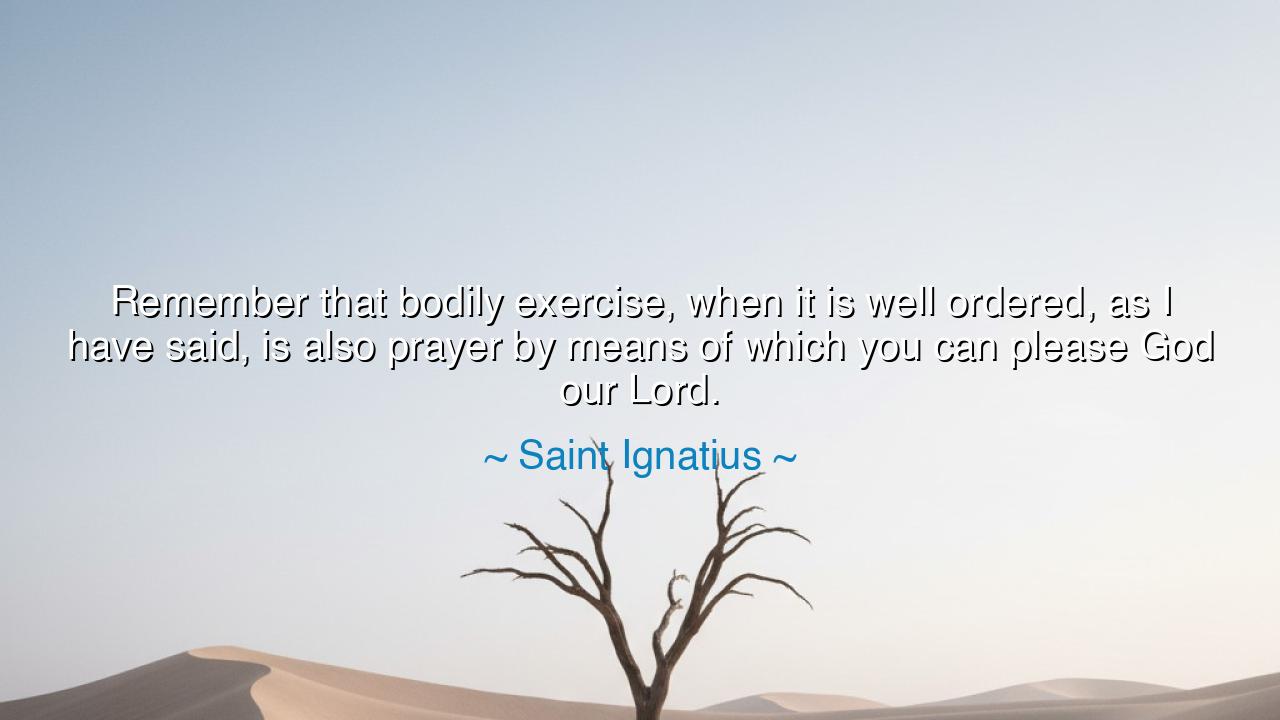
Remember that bodily exercise, when it is well ordered, as I have
Remember that bodily exercise, when it is well ordered, as I have said, is also prayer by means of which you can please God our Lord.






The words of Saint Ignatius of Loyola, founder of the Jesuit order, echo with the wisdom of body, mind, and spirit in harmonious union: “Remember that bodily exercise, when it is well ordered, as I have said, is also prayer by means of which you can please God our Lord.” In this profound statement, Ignatius reveals a truth often overlooked: the sacred is not confined to silent contemplation or scripted prayers, but flows through disciplined, purposeful movement. The act of exercising the body, when directed with intention and order, becomes a living prayer, a tangible offering to the divine, where the rhythm of motion mirrors the rhythm of devotion.
The origin of this quote lies in Ignatius’ experience as both soldier and saint in 16th-century Spain. Before his spiritual conversion, he was a man of action, trained in martial discipline and bodily rigor. During his recovery from a grievous injury in battle, Ignatius experienced a profound awakening: the body, properly tended and exercised, could serve as an instrument of devotion. He observed that strength, order, and discipline of the body are not separate from the cultivation of the soul, but a path through which one aligns with God’s will. Exercise, therefore, becomes both practical and sacred, a conduit for divine connection.
At the heart of this teaching is the principle of integration between physical and spiritual life. Many traditions emphasize the separation of body and spirit, yet Ignatius asserts that order and intention in bodily action are themselves forms of prayer. Movement guided by purpose, whether in walking, training, or disciplined labor, is a reflection of the inner order, a way of attuning the self to divine rhythm. By bringing mindfulness and devotion to physical activity, one transforms ordinary exertion into sacred communion, a testament that the divine can be honored in every action of life.
History offers vivid examples that illustrate this insight. Consider monastic traditions in Asia, where meditation and martial arts are intertwined. Shaolin monks, for instance, cultivate both spiritual insight and bodily mastery, understanding that discipline of the body strengthens the spirit. Similarly, Ignatius teaches that exercise, far from being merely a worldly concern, is a practice that aligns the flesh with the soul, honoring God through ordered motion and conscious discipline. In every push, pull, and stride, the devotee communes with the divine.
Ignatius’ words also resonate emotionally because they remind us that prayer is not confined to words or posture; it is an act of intention. The heart, mind, and body together offer devotion. By recognizing the sacred potential in movement, he elevates daily life into a tapestry of worship, where even sweat and exertion become instruments of grace. To exercise with order and mindfulness is to echo the eternal rhythm of creation, offering homage to the Creator in every disciplined act.
The lesson here is both practical and transformative. Treat the body with reverence, cultivate strength and health, and engage in physical activity with intentionality. Let every stride, stretch, or motion be a reflection of devotion, an offering that honors God through discipline and presence. The act of caring for one’s body, when guided by purpose, becomes a spiritual practice, a prayer that flows from motion, harmony, and alignment with divine will.
Practically, this can manifest in simple acts: walking in mindfulness, practicing sports or exercises with gratitude and focus, or engaging in labor that strengthens the body while serving a higher purpose. Recognize that the body is not a vessel of mere necessity but a sacred instrument through which prayer can flow. By integrating physical discipline with spiritual intention, one cultivates resilience, clarity, and alignment with God’s order.
Thus, the words of Saint Ignatius endure as both guidance and inspiration: “Bodily exercise, when it is well ordered, is also prayer by means of which you can please God our Lord.” Let them remind us to honor the body as an instrument of devotion, to bring mindfulness and purpose to every motion, and to recognize that every act of disciplined physical exertion can resonate with the eternal. In this harmony of body, mind, and spirit, prayer becomes not only a spoken act but a living, moving homage to the divine.






AAdministratorAdministrator
Welcome, honored guests. Please leave a comment, we will respond soon